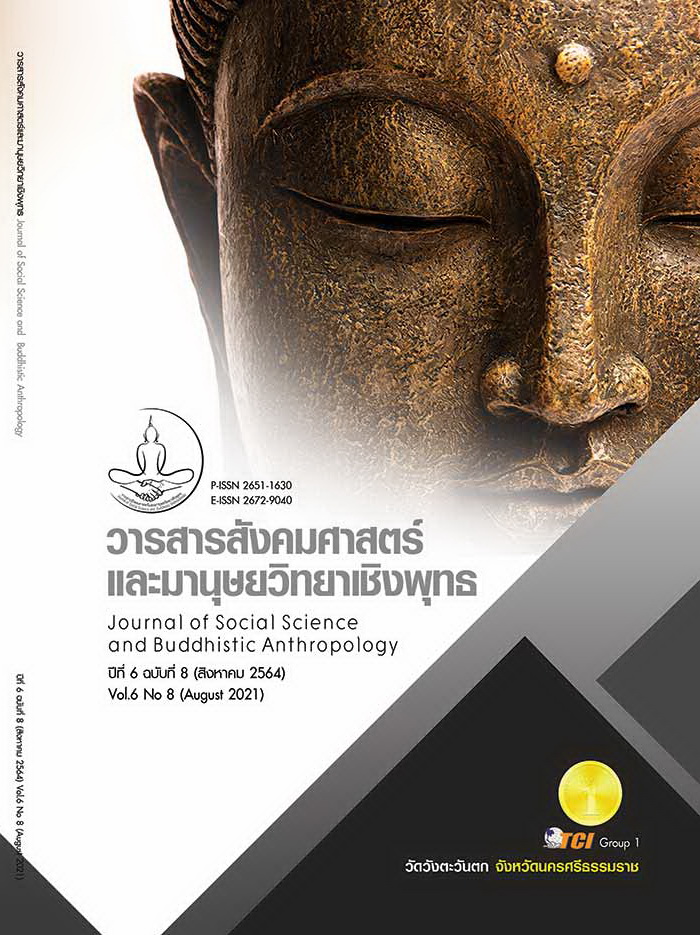ANTECEDENT OF THE SUCCESS OF THE SECURITY BUSINESS
Keywords:
Security Business, Capital, Management and Administration, AntecedentAbstract
The objectives of this article were to: 1) study the level of success of the security business; and 2) influences of legal mechanisms, management and administration, employers’ satisfaction, and capital on the success of the security business. This research employed a quantitative method. The sample consisted of 300 security business entrepreneurs registering with the Security Services Association of Thailand. The sample size was determined based on the criterion of 20 times the observed variables. They were selected via stratified sampling. The research instruments were questionnaire. It is an opinion questionnaire about factors affecting the success of the business, data was collected by a 5 level Likert rating-scale questionnaire. Analyzed with a structural equation model through linear structure relationship. The findings showed that: 1) the success of security business was rated at a high level. When considered individually, it was found that the security business has achieved very high levels of success in all areas. By the confidence of customers More than any other, followed by performance and sustainability. and 2) capital had the greatest influence on the success of security business, followed by employers’ satisfaction, management and administration, and legal mechanisms, respectively. When considering only the factors that directly affect the success of the security business, it was found that capital had the greatest influence on the success of the security business, followed by management, while legal mechanisms and employers’ satisfaction, it only indirectly affects the success of the security business.
References
ณัฐ อมรภิญโญ. (2556). ศึกษารูปแบบการประสบความสำเร็จที่ยั่งยืนของผู้ประกอบการรายย่อยในภาคตะวันออกเฉียงเหนือตอนบน ประเทศไทย. วารสารวิชาการศรีปทุม ชลบุรี, 9(3), 57-66.
ดวงใจ ภารการ. (2558). แหล่งเงินทุนธุรกิจขนาดย่อม. เรียกใช้เมื่อ 1 กรกฎาคม 2562 จาก https://sites.google.com/a/ttn.ac.th/66666/10-haelng-ngein-thun-sahrab-thurkic-khnad-yxm
ทนายคลายทุกข์. (2559). กฎหมายพนักงานรักษาความปลอดภัย(รปภ.). เรียกใช้เมื่อ 1 กรกฎาคม 2562 จาก https://www.decha.com/
ธณัฐพล ชะอุ่ม และปรีชา หงส์ไกรเลิศ. (2558). การบริหารจัดการที่มีผลต่อประสิทธิผลของเทศบาลตำบลในเขตภาคกลางของประทศไทย. วารสารวิทยากรจัดการสมัยใหม่, 8(1), 137-152.
ประวีณ ณ นคร. (2558). วินัย:หลักและวิธีการรักษาวินัย. กรุงเทพมหานคร: กลุ่มโรงพิมพ์ สำนักเลขาธิการสำนักงาน ก.พ.
พรอนงค์ บุษราตระกูล และสุนทรี เหล่าพัดจีน. (2560). การศึกษาความสัมพันธ์ระหว่างค่าตอบแทนกรรมการระดับของการกำกับดูแลกิจการที่ดีและผลการดำเนินงานของบริษัทจดทะเบียนของประเทศไทย. กรุงเทพมหานคร: ตลาดหลักทรัพย์แห่งประเทศไทย.
พัทธ์ธีรา จิรอุดมสาโรจน์. (2560). ความสัมพันธ์มูลค่าราคาตามบัญชี กำไรต่อหุ้นและเงินปันผลของบริษัทที่จดทะเบียนในตลาดหลักทรัพย์แห่งประเทศไทยกลุ่มดัชนี100. วารสารวิชาการมหาวิทยาลัยธนบุรี, 11(25),99-106.
มหาวิทยาลัยเทคโนโลยีราชมงคลกรุงเทพ. (2557). คู่มือเทคนิคการให้บริการอย่างมีประสิทธิภาพ. เรียกใช้เมื่อ 1 มีนาคม 2562 จาก http://wiki.rmutk.ac.th/index .php
วัชธาพงศ์ ยอดราช. (2560). ผลกระทบของการเปลี่ยนแปลงความสามารถในการทำกำไรและความเสี่ยงที่มีต่อราคาหลักทรัพย์ของบริษัทในตลาดหลักทรัพย์ใหม่. วารสารวิจัยแลพัฒนา มหาวิทยาลัยราชภัฏบุรีรมย์, 12(1), 80-87.
สงวนพงศ์ ชวนชม และธนัยวงศ์ กีรติวานิชย์. (2561). แหล่งเงินทุนภายในกิจการที่ควรรู้จัก. เรียกใช้เมื่อ 1 มีนาคม 2562 จาก http://www.tpa.or.th
สมาคมผู้ประกอบการรักษาความปลอดภัยแห่งประเทศไทย. (2558). ความเป็นมาของสมาคมฯ. เรียกใช้เมื่อ 1 มีนาคม 2562 จาก http://www.securitythaicenter .com/article?130.html
สายัณห์ วงศ์สุรินทร์. (2557). การพัฒนารูปแบบการจัดการเรียนรู้ตามแนวคิดจิตตปัญญาศึกษาเพื่อพัฒนาความมีวินัยของนักเรียนโรงเรียนพระปริยัติธรรมแผนกสามัญศึกษา. วารสารมนุษยศาสตร์และสังคมศาสตร์ (สทมส.), 21(3), 133-144.
สุฎิกา รักประสูติ. (2559). การศึกษาสาเหตุและลักษณะข้อมูลในการปรับงบการเงินย้อนหลังของบริษัทจดทะเบียนในตลาดหลักทรัพย์แห่งประเทศไทย. ใน รายงานการวิย. มหาวิทยาลัยธุรกิจบัณฑิตย์.
องค์กรรักษาความปลอดภัยฝ่ายพลเรือนของสำนักข่าวกรองแห่งชาติ. (2559). ความปลอดภัยพื้นฐาน. เรียกใช้เมื่อ 1 กรกฎาคม 2562 จาก http://www.secnia.go.th
Barbier, E. (2018). Sustainable Development Goals. Retrieved July 1, 2019, from http://www.amazon.com/Edward-B.-Barbier/e/B001K73B6M
Bhattacharya, S. (2018). How to win Customer Confidence for your brand. Retrieved July 16, 2019, from https://www.revechat.com/blog/how-to-win-customer-confidence-for-your-brand/
Cronbach, L. J. (1970). Essential of Psychological Testing. New York: Harper Row.
Diamantopoulos, A. & Siguaw, J. A. (2000). Introduction to LISREL: A guide for the uninitiated. London: Sage.
Khera, R. (2019). 5 Strategies to Develop Customer Confidence and Trust. Retrieved July 1, 2019, from https://www.morebusiness.com/building-customer-trust/
Kline, R. B. (2005). Principle and practice of structural equation modeling. NY: Guilford.
Likert, R. (1967). “The Method of Constructing and Attitude Scale” Attitude Theory and Measurement. New York: Wiley & Son.
Mansoon, H. (2017). 7 Ways to Build Your Customer’s Confidence for Your Brand. Retrieved July 1, 2019, from http://customerthink.com/7-ways-to-build-your-customers-confidence-for-your-brand/
Pasona HR Consulting Recruitment (Thailand). (2560). ทำงานอย่างไรให้เป็นมืออาชีพ. เรียกใช้เมื่อ 1 มีนาคม 2562 จาก https://pasona.co.th/b/1167
Walters, J. (2015). New Report Reveals How to Build Customer Confidence in 2015. Retrieved July 1, 2019, from https://experienceinvestigators.com /report-reveals-how-build-customer-confidence/









